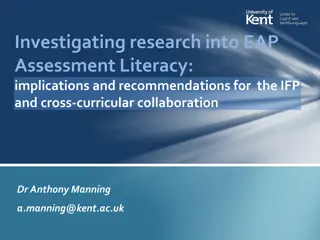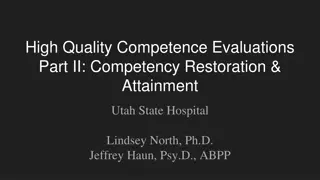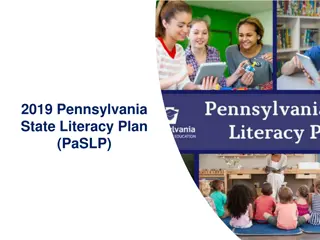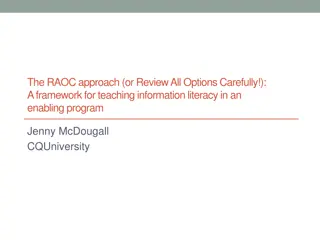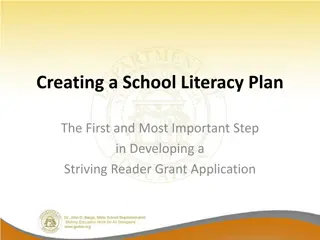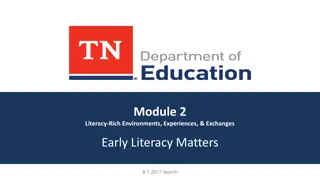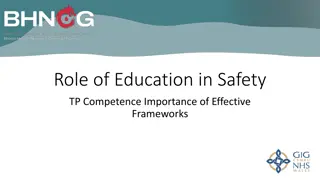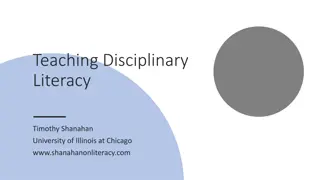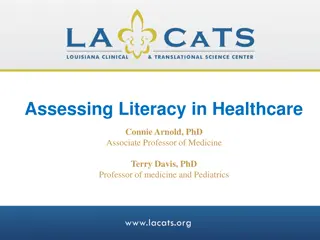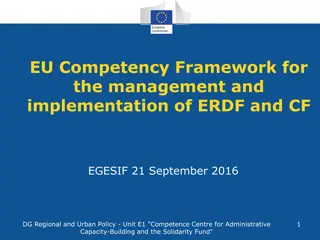Understanding Data Literacy: Models, Assessment, and Competency Frameworks
Data literacy is the ability to collect, manage, evaluate, and apply data critically. Various frameworks and models exist, such as competency models, evaluation frameworks, and teaching frameworks developed by organizations like the National Research Council of Canada. Core skills and competencies underpin data literacy, encompassing skills in data collection, management, evaluation, and application. Several studies delve into defining data literacy, emphasizing the importance of deriving meaningful information from data and utilizing it ethically and effectively.
Download Presentation

Please find below an Image/Link to download the presentation.
The content on the website is provided AS IS for your information and personal use only. It may not be sold, licensed, or shared on other websites without obtaining consent from the author. Download presentation by click this link. If you encounter any issues during the download, it is possible that the publisher has removed the file from their server.
E N D
Presentation Transcript
Data Literacy Models, Assessment, and Development Stephen Downes March 28, 2022
Three Frameworks Competency Model or Framework Evaluation or Assessment Framework Teaching Framework NATIONAL RESEARCH COUNCIL CANADA 2
Competency Model or Framework Evaluation or Assessment Framework Teaching Framework NATIONAL RESEARCH COUNCIL CANADA 3
Defining Data Literacy Data literacy is the ability to collect, manage, evaluate, and apply data, in a critical manner (p. 2). We define the core skills and competencies that comprise data literacy, using a thematic analysis of the elements of data literacy described in peer-reviewed literature. These competencies (23 in total) and their skills, knowledge, and expected tasks (64 in total) are organized under the top-level elements of the definition (data, collect, manage, evaluate, apply) and are categorized as conceptual competencies, core competencies, and advanced competencies. Chantel Ridsdale, et.al.. 2015. Strategies and Best Practices for Data Literacy Education. Dalhousie University. https://dalspace.library.dal.ca/bitstream/handle/10222/64578/Strategies%20and%20Best%20Practices%20for%20Data%20Lit eracy%20Education.pdf?sequence=1&isAllowed=y (Open University) NATIONAL RESEARCH COUNCIL CANADA 4
Defining Data Literacy Wolff, et.al. 2016. Data literacy is the ability to ask and answer real- world questions from large and small data sets through an inquiry process, with consideration of ethical use of data. It is based on core practical and creative skills, with the ability to extend knowledge of specialist data handling skills according to goals. These include the abilities to select, clean, analyse, visualise, critique and interpret data, as well as to communicate stories from data and to use data as part of a design process. Annika Wolff, Daniel Gooch, Jose J. Cavero Montaner, Umar Rashid, Gerd Kortuem. 2016. Creating an understanding of data literacy for a data-driven society. https://openjournals.uwaterloo.ca/index.php/JoCI/article/view/3275 NATIONAL RESEARCH COUNCIL CANADA 5
Defining Data Literacy Data literacy is the ability to derive meaningful information from data (Sperry 2018). To summarize, a data literate individual would, at minimum, be able to understand information extracted from data and summarized into simple statistics, make further calculations using those statistics, and use the statistics to inform decisions. However, this definition is context-dependent... (Bonikowska, Sanmartin and Frenette, Statistics Canada, 2019) https://www150.statcan.gc.ca/n1/pub/11-633-x/11-633-x2019003-eng.htm NATIONAL RESEARCH COUNCIL CANADA 6
Defining Data Literacy "Data literacy" is formally called out as a new core competency as part of a clear commitment to the organization and leadership valuing "information as a strategic asset." Training programs (online and/or in-person; internal and/or external) are available and supported across all required levels of proficiency. (Gartner, 2019, Toolkit) Gartner. 2019. Toolkit: Data Literacy Individual Assessment. Gartner. https://www.gartner.com/en/documents/3983897/toolkit-data-literacy-individual-assessment Alan D. Duncan, Donna Medeiros, Aron Clarke, Sally Parker. 2021. How to Measure the Value of Data Literacy. Gartner. https://www.gartner.com/en/documents/4003941-how-to-measure-the-value-of-data-literacy NATIONAL RESEARCH COUNCIL CANADA 7
Defining Data Literacy Literacy broadly means having competency in a particular area. Data literacy includes the skills necessary to discover and access data, manipulate data, evaluate data quality, conduct analysis using data, interpret results of analyses, and understand the ethics of using data. (Department of National Defence, 2019) Department of National Defence . 2019. Annex A Definitions. The Department of National Defence and Canadian Armed Forces Data Strategy. https://www.canada.ca/en/department-national-defence/corporate/reports- publications/data-strategy.html John Walsh. 2021. Implementing DND/CAF Data Strategy. Canada.ca, Department of National Defence. https://publicsectornetwork.co/wp-content/uploads/2021/09/John-Walsh-PDF.pdf NATIONAL RESEARCH COUNCIL CANADA 8
Major Themes Data literacy as a set of skills or competencies The idea of deriving meaningful information from data The data lifecycle or data workflow Complexity of skills for differing roles Data literacy as individual and corporate capacities NATIONAL RESEARCH COUNCIL CANADA 9
Exmples Drive Navy performance improvement through mission-driven metric reporting advanced data analytics techniques U.S. Navy Performance to Plan (P2P) Driver Tree Data Dictionary https://p2p.navy.mil/ https://medium.com/swlh/driver-trees-a-tool-to-make-your- teams-more-successful-88f751e86482 NATIONAL RESEARCH COUNCIL CANADA 10
Examples Azure Health Data Services Example of data management and use (in health care). "Azure Health Data Services, a platform as a service (PaaS) designed to support Protected Health Information (PHI) in the cloud." Heather Jordan Cartwright. 2022. Microsoft launches Azure Health Data Services to unify health data and power AI in the cloud. Microsoft. https://azure.microsoft.com/en-us/blog/microsoft-launches-azure-health- data-services-to-unify-health-data-and-power-ai-in-the-cloud/ NATIONAL RESEARCH COUNCIL CANADA 11
Examples Datawise Program to teach instructors to use data to support learning and assessment Addresses a need to bridge the resources of an institution of higher education with the instructional capacity of professional development providers and the authentic experiences of school-based practitioners. Candice Bocala, Kathryn Parker Boudett, Teaching Educators Habits of Mind for Using Data Wisely, Teachers College Record. https://www.tcrecord.org/Content.asp?ContentID=17853 Boudett, K. P., City, E. A., & Murnane, R. J.(2013). Data Wise: A step-by-step guide to using assessment results to improve learning and teaching (revised and expanded ed.). Cambridge, MA: Harvard Education Press. NATIONAL RESEARCH COUNCIL CANADA 12
Data The representation of facts as text, numbers, graphics, images, sound, or video (The Department of National Defence and Canadian Armed Forces Data Strategy, 2019) https://www.canada.ca/en/department-national- defence/corporate/reports-publications/data-strategy.html An object, variable, or piece of information that has the perceived capacity to be collected, stored, and identifiable. (Bhargava, et.al., 2015) https://datapopalliance.org/item/beyond-data-literacy-reinventing-community-engagement- and-empowerment-in-the-age-of-data/ NATIONAL RESEARCH COUNCIL CANADA 13
Data Types of data Data types Structure Semi- structured Entry Form Structured Unstructured Mixed Sensor data Verbal reports Combination of the other Geospatial News article Photographs types Quantities API response Blog posts NATIONAL RESEARCH COUNCIL CANADA 14
Data Types of data Data types Velocity Batch Near-time Real-time Stream Continuous input, process output At time intervals At small time intervals Data flows NATIONAL RESEARCH COUNCIL CANADA 15
Data Types of data Data types Formats Numeric Text Media Mixed Counts Images Articles Combination of the three Values Graphs Transcripts Measures Charts Form input https://datatracker.ietf.org/doc/html/rfc6838 https://guides.library.oregonstate.edu/research-data-services/data-management-types-formats NATIONAL RESEARCH COUNCIL CANADA 16
Data Model The term machine learning was coined in 1959 to describe the application of statistical algorithms to learning problems, for example, how to play checkers. https://mdpi- res.com/d_attachment/ijgi/ijgi- 11-00130/article_deploy/ijgi- 11-00130-v2.pdf Melpomeni Nikou and Panagiotis Tziachris, 2022 NATIONAL RESEARCH COUNCIL CANADA 17
Machine Learning The term machine learning was coined in 1959 to describe the application of statistical algorithms to learning problems, for example, how to play checkers. https://ieeexplore.ieee.org/doc ument/5392560 Arthur Samuel (1959) for IBM NATIONAL RESEARCH COUNCIL CANADA 18
Data Workflows Machine Learning Engineering MLops https://ml- ops.org/content/en d-to-end-ml- workflow NATIONAL RESEARCH COUNCIL CANADA 19
Data Workflows Big Data Analytics Marcos D. Assuncao, Rodrigo N. Calheiros, Silvia Bianchi, Marco A. S. Netto, Rajkumar Buyya. (2014). Big Data Computing and Clouds: Trends and Future Directions. Journal of Parallel and Distributed Computing. https://www.researchgate.net/publication/ 259335041_Big_Data_Computing_and_Clo uds_Challenges_Solutions_and_Future_Dir ections NATIONAL RESEARCH COUNCIL CANADA 20
Data Workflows GAISE Anna Bargagliotti, et.al. (2020). Pre-K 12 Guidelines for Assessment and Instruction in Statistics Education II (GAISE II). American Statistical Association. https://www.amstat.org/docs/default -source/amstat- documents/gaiseiiprek-12_full.pdf NATIONAL RESEARCH COUNCIL CANADA 21
Subdivisions Information Literacy Probability and Statistics Critical Thinking Data Management NATIONAL RESEARCH COUNCIL CANADA 22
Competencies are a set of basic knowledge, skills, abilities, and other characteristics that enable people at work to efficiently and successfully accomplish their job tasks https://www.sciencedirect.com/science/article/pii/S03601315 19303057?casa_token=u0BT0lHseNwAAAAA:AmTC_kv0KFakde rwurRBSHFsLt19ApTPqNQ0kmF5hRBxm5QoPIh3oa85ooay1NjG HCWQ_kd7Fw#bib36 NATIONAL RESEARCH COUNCIL CANADA 23
Data Data Awareness Awareness Dispositions Dispositions Strategy/Culture Strategy/Culture Plan, Implement, Mon Plan, Implement, Mon Inquiry Process Inquiry Process Discovery / Explore Discovery / Explore Ethics Ethics Gathering / Collection Gathering / Collection Curation Curation Communities Communities Requirements Requirements Valuation Valuation Evaluation/Assessment Evaluation/Assessment Informed Decision Informed Decision- -mak Governance / Steward Governance / Steward Standards Standards Description/Metadata Description/Metadata Conversion, Conversion, Interopabl Management Management Preservation Preservation Cleaning Cleaning Systems & Tools Systems & Tools Policy Policy Quality Quality Security Security Manipulation Manipulation Statistics & Reasoning Statistics & Reasoning Critical Thinking Critical Thinking Analysis Analysis Interpretation Interpretation Modeling/Architecture Modeling/Architecture Data Science and ML Data Science and ML Citation & Sharing Citation & Sharing Visualization Visualization Storytelling Storytelling Present Data Verbally Present Data Verbally Change Change Using/Innovating With Using/Innovating With Identifying Problems Identifying Problems Generate Data Generate Data 1 1 x 2 2 3 3 x 4 4 5 5 6 6 7 7 8 8 9 9 10 10 11 11 x 12 12 13 13 14 14 x 15 15 16 16 17 17 x 18 18 19 19 x 20 20 x x x x x x x x x x x x x x x x x x x x x x x x x x x x x x x x x x x x x x x x x x x x x x x x x x x x x x x x x x x x x x x x x mak x x x x x x x x x x x x x x x x x x x x x x x x x x x x x x x x x x x x Interopabl x x x x x x x x x x x x x x x x x x x x x x x x x x x x x x x x x x x x x x x x x x x x x x x x x x x x x x x x x x x x x x x x x x x x x x x x x x x x x x x x x x x x x x x x x x x x x x x x x x x x x x x x x x x x x x x x x x x x x x x x x x x x x x 24 x
0 2 4 6 8 10 12 14 16 18 Data Data Awareness Awareness Dispositions Dispositions Strategy/Culture Strategy/Culture Plan, Implement, Mon Plan, Implement, Mon Inquiry Process Inquiry Process Discovery / Explore Discovery / Explore Ethics Ethics Gathering / Collection Gathering / Collection Curation Curation Communities Communities Requirements Requirements Valuation Valuation Evaluation/Assessment Evaluation/Assessment Informed Decision Informed Decision- -mak Governance / Steward Governance / Steward Standards Standards Description/Metadata Description/Metadata Conversion, Conversion, Interopabl Management Management Preservation Preservation Cleaning Cleaning Systems & Tools Systems & Tools Policy Policy Quality Quality Security Security Manipulation Manipulation Statistics & Reasoning Statistics & Reasoning Critical Thinking Critical Thinking Analysis Analysis Interpretation Interpretation Modeling/Architecture Modeling/Architecture Data Science and ML Data Science and ML Citation & Sharing Citation & Sharing Visualization Visualization Storytelling Storytelling Present Data Verbally Present Data Verbally Change Change Using/Innovating With Using/Innovating With Identifying Problems Identifying Problems Generate Data Generate Data 7 1 6 2 4 11 9 10 3 1 2 2 5 mak 11 9 3 9 Interopabl 7 13 4 4 9 1 10 5 8 5 2 17 6 5 2 5 14 7 3 4 3 4 25 1
Data Data Awareness Awareness Dispositions Dispositions Strategy/Culture Strategy/Culture Plan, Implement, Mon Plan, Implement, Mon Inquiry Process Inquiry Process Discovery / Explore Discovery / Explore Ethics Ethics Gathering / Collection Gathering / Collection Curation Curation Communities Communities Requirements Requirements Valuation Valuation Evaluation/Assessment Evaluation/Assessment Informed Decision Informed Decision- -mak Governance / Steward Governance / Steward Standards Standards Description/Metadata Description/Metadata Conversion, Conversion, Interopabl Management Management Preservation Preservation Cleaning Cleaning Systems & Tools Systems & Tools Policy Policy Quality Quality Security Security Manipulation Manipulation Statistics & Reasoning Statistics & Reasoning Critical Thinking Critical Thinking Analysis Analysis Interpretation Interpretation Modeling/Architecture Modeling/Architecture Data Science and ML Data Science and ML Citation & Sharing Citation & Sharing Visualization Visualization Storytelling Storytelling Present Data Verbally Present Data Verbally Change Change Using/Innovating With Using/Innovating With Identifying Problems Identifying Problems Generate Data Generate Data 1 1 x 2 2 3 3 x 4 4 5 5 6 6 7 7 8 8 9 9 10 10 11 11 x 12 12 13 13 14 14 x 15 15 16 16 17 17 x 18 18 19 19 x 20 20 x x Row 13 Databilities x x x x x x x x x x x x x x x x x x x x x x x x x x x x x x x x x x x x x x x x x x x x x x x x x x x x x x x x x x x x x x x mak x x x x x x x x x x x x x x x x x x x x x x x x x x x x x x x x x x x x Interopabl x x x x x x x x x x x x x x x x x x x x x x x x x x x x x x x x x x x x x x x x x x x x x x x x x x x x x x x x x x x x x x x x x x x x x x x x x x x x x x x x x x x x x x x x x x x x x x x x x x x x x x x x x x x x x x x x x x x x x x x x x x x x x x 26 x
Defining Data Literacy Individual Organizational Team Division Branch Tools and systems Employee skills and capabilities Procedures and mechanisms NATIONAL RESEARCH COUNCIL CANADA 27
Defining Data Literacy Data Literacy Organizational Individual Capabilities Activities Tools & Systems Skills Procedures Team Division Branch NATIONAL RESEARCH COUNCIL CANADA 28
Competencies Specifically, a competency is a set of skills, related knowledge and attributes that allow an individual to successfully perform a task or an activity within a specific function or job (United Nations Industrial Development Organization (UNIDO), 2002). https://www.researchgate.net/publication/282971399_Com petency_of_Adult_Learners_in_Learning_Application_of_the _Iceberg_Competency_Model UNIDO competencies: Strengthening organizational core values and managerial capabilities https://docplayer.net/9459584-Unido-competencies- strengthening-organizational-core-values-and-managerial- capabilities.html NATIONAL RESEARCH COUNCIL CANADA 29
Defining Data Literacy Individual Organizational Knowledge Definitions Skills / Competencies Capacities Attitudes Practices NATIONAL RESEARCH COUNCIL CANADA 30
Example: Data Visualization Individual Organizational Knowledge - knows visualization formats - understands data representation Definitions - standard visualizations for key data - visualizations referenced to original data Skills / Competencies - can create visualizations from data - can generate meaning from visualizations Capacities - staff have access to data visualizations - staff includes data visualization expertise Attitudes - is comfortable working with visualizations - recognizes importance of visualizations Practices - maintains data visualization software tools - data visualization part of reports workflow NATIONAL RESEARCH COUNCIL CANADA 31
Competency Model or Framework Evaluation or Assessment Framework Teaching Framework NATIONAL RESEARCH COUNCIL CANADA 32
Assessment Programs OECD The Programme for the International Assessment of Adult Competencies (PIAAC) Programme for International Student Assessment (PISA) https://www.oecd- ilibrary.org/education /the-policy-impact-of- pisa_5k9fdfqffr28-en (PIAAC) (Second Edition) (2016) https://www.oecd.org/ skills/piaac/PIAAC_Tech nical_Report_2nd_Editi on_Full_Report.pdf OECD (PISA). 2021. Are 15-year-olds prepared to deal with fake news and misinformation? https://www.oecd- ilibrary.org/education/are-15-year-olds-prepared-to-deal-with-fake-news-and-misinformation_6ad5395e-en OECD (PIAAC). 2021. PIAAC Round 3 International Launch Webinar. https://www.oecd.org/skills/piaac/ NATIONAL RESEARCH COUNCIL CANADA 33
Assessment Programs Guidelines for Assessment and Instruction in Statistics Education (GAISE) Robert Carver, et.al.. (2016). Guidelines for Assessment and Instruction in Statistics Education (GAISE) College Report. American Statistical Association. https://www.amstat.org/docs/default- source/amstat-documents/gaisecollege_full.pdf Anna Bargagliotti, et.al. (2020). Pre-K 12 Guidelines for Assessment and Instruction in Statistics Education II (GAISE II). American Statistical Association. https://www.amstat.org/docs/default-source/amstat- documents/gaiseiiprek-12_full.pdf https://journals.gmu.edu/index.php/ITLCP/article/view/2241 NATIONAL RESEARCH COUNCIL CANADA 34
Assessment Programs Eckerson Group Data Literacy Imperative https://ecm.elearnin gcurve.com/Articles. asp?ID=369 Dave Wells. 2022. The Data Literacy Imperative - Part III: Data Literacy Assessment. Eckerson Group. https://www.eckerson.com/articles/the-data-literacy-imperative-part-iii-data-literacy-assessment NATIONAL RESEARCH COUNCIL CANADA 35
Data Literacy Model-Based Assessment Extant list of skills based on empirical analysis of data workflows This list can be cross- referenced with a comprehensive skills taxonomy (For simplicity I used a modified Bloom s Taxonomy) Treated as taxonomies not hierarchies Represented as types of skills or competences https://psycnet.apa.org/record/2003-00041-000 NATIONAL RESEARCH COUNCIL CANADA 36
Assessing Data Literacy Bloom s Individual Organizational Cognitive Knowledge Definitions Psychomotor Skills / Competencies Capacities Affective Attitudes Practices NATIONAL RESEARCH COUNCIL CANADA 37
Knowledge Individual Organizational Knowledge - Know what data is, recognize data vs non-data - Has or uses data in some way Comprehension - Know methods to read data, comprehend data - Provides mechanisms for data access Application - Know how data can be used - Data can be used as input in tools and systems Analysis - Understand parts of data, types of data - Data can be accessed in different views, formats Synthesis - Know ways to join of connect data - Data can be pooled or connected Evaluation - Identify quality data, appropriate data - The are organizational data quality standards Creation - Create data - Data is recorded and produced in the organization NATIONAL RESEARCH COUNCIL CANADA 38
Skills / Competencies Individual Organizational Perception - Be able to discover, read, explore data - The organization actively collects data Set - Can follow data processes and procedures - There are data management processes Guided Response - Can follow instructions and respond to data - There is a capacity to respond to data Mechanism - Knows about and can use data tools and systems - Data management tools and systems are supported Complex Overt Response - Can make decisions using data - Decisions are driven by data Adaptation - Can create data visualizations, stories - Visualizations and data stories are used Origination - Can create and share data from new sources - The organization regularly collects and shares data NATIONAL RESEARCH COUNCIL CANADA 39
Attitudes Individual Organizational Receiving - Is open to learning from data - Data is welcomed and sought after Recognizing - Can detect patterns and regularities in data - Data is considered and analyzed; there are data-based alerts Responding - Is willing to act on new data - Data drives actions and responses to challenges Framing - Is willing to work in a data-centered way - Knowledge management is data centered Valuing - Values and can assign value to different types of data - Data is valued in the organization and quality controls apply Organizing - Actively orients data to address challenges - Key strategies are oriented by data Characterizing - Develops abstractions, generalizations and principles - Organizational frameworks, structures, procedures driven by data NATIONAL RESEARCH COUNCIL CANADA 40
Levels GAISE: Levels A, B, C program contents Quanthub Personas Jen DuBois. 2022. Thriving Data Culture Starts with Data Literacy Assessments. QuantHub. https://quanthub.com/data-literacy-assessment/ NATIONAL RESEARCH COUNCIL CANADA 41
NU Data, a professional development intervention aimed at preparing special education teams to use data-based decision making to improve academic outcomes for students with disabilities. Doll, et.al., 2014. https://ies.ed.gov/funding/grantsearch/details.asp?ID=1131 Sikorski, 2016 https://digitalcommons.unl.edu/cgi/viewcontent.cgi?article=12 68&context=cehsdiss Means, et.al. 2011. Teachers' Ability to Use Data to Inform Instruction: Challenges and Supports Below Basic, Basic, Proficient, Advanced https://www2.ed.gov/rschstat/eval/data-to-inform- instruction/report.pdf https://dataliteracy.com/data-literacy-score/ NATIONAL RESEARCH COUNCIL CANADA 42
Role-Defined Data Literacy Role-Defined Data Literacy Skills Profile Awareness x Generate Data Dispositions Strategy/Culture x Plan, Implement, Mon Inquiry Process Discovery / Explore Ethics x 18 Identifying Problems Using/Innovating With 16 Change 14 Present Data Verbally 12 Storytelling x 10 Visualization x Gathering / Collection Curation 8 6 Citation & Sharing 4 Data Science and ML Communities 2 Modeling/Architectur e Requirements 0 Interpretation Valuation Evaluation/Assessmen t Informed Decision- mak x Governance / Steward x Standards x Description/Metadata Conversion, Interopabl x Management Preservation Cleaning Analysis x Critical Thinking Statistics & Reasoning Manipulation Security x Quality x Systems & Tools x Policy Etc https://forces.ca/en/careers NATIONAL RESEARCH COUNCIL CANADA 43
Assessment Methods Self-Report Skills Test (Multiple Choice) Skills Test (Open Response) Analysis https://dataliteracy.com/data-literacy-score/ NATIONAL RESEARCH COUNCIL CANADA 44
Methods Self-Report 2019. Take the 17 Key Traits of Data Literacy Self-Assessment. Data Literacy. https://dataliteracy.com/take-the- 17-key-traits-self-assessment/ Ben Jones. 2021. A Data Literacy Assessment for Every Employee. Udemy. https://business.udemy.com/resources/data-skills-assessment-template/ NATIONAL RESEARCH COUNCIL CANADA 45
Methods Self-Report Fix, 2022. The Dunning-Kruger Effect is Autocorrelation https://economicsfromthetopdown.com/ 2022/04/08/the-dunning-kruger-effect- is-autocorrelation/ Canada School of Public Service. . How Data Literate Are You?. Government of Canada. https://catalogue.csps- efpc.gc.ca/product?catalog=DDN302&cm_locale=en Criticism: Williams, et.al., 2017 https://psych.utah.edu/_resources/documents/people/williams/williams-et-al_pa-17.pdf NATIONAL RESEARCH COUNCIL CANADA 46
Method Skills Test (Open Response) https://www.ugdsb.ca/jfr/literacy-test-osslt-ross/ https://drive.google.com/file/d/1LsDbvAy_YHepMVD9VVEEWH6w5U_Dk1-E/view Fostering Data Literacy through Preservice Teacher Inquiry in English Language Arts https://education.ucdavis.edu/sites/main/files/file-attachments/teacher_inquiry_and_data_literacy.pdf NATIONAL RESEARCH COUNCIL CANADA 47
Method Rubric AI essay graders https://www.frontiersin .org/articles/10.3389/fe duc.2020.572367/full https://www.nsta.org/journal-college-science-teaching/journal-college-science-teaching- marchapril-2021/measuring-data NATIONAL RESEARCH COUNCIL CANADA 48
Method Skills Test (Multiple Choice) The objective here is to develop a multiple-choice ( MC ) assessment of students ability that compares favorably with more time-consuming, open response instruments. Design and development effort using Rasch modeling. The Rasch model assumes that the underlying construct that is being measured varies along a single dimension (Bond & Fox, 2012). Bill Zoellick, Molly Schauffler, Marcella Flubacher. Ryan Weatherbee, Hannah Webber. (2016). Data Literacy: Assessing Student Understanding of Variability in Data. Annual Meeting of the National Association for Research in Science Teaching. https://www.researchgate.net/publication/301802243_Data_Literacy_Assessing_Student_Understanding_of_Variability_in_Data NATIONAL RESEARCH COUNCIL CANADA 49
https://www.eqao.com/the-assessments/osslt/ NATIONAL RESEARCH COUNCIL CANADA 50







